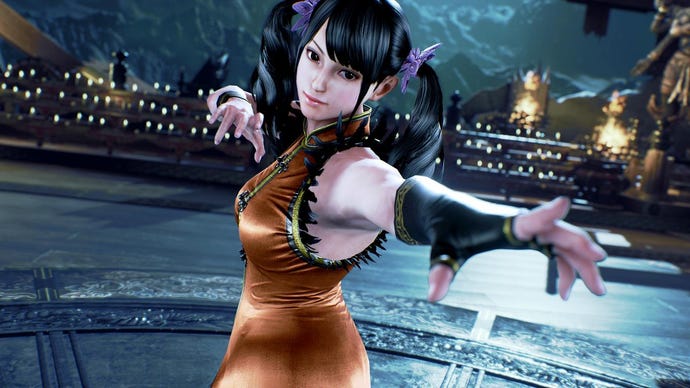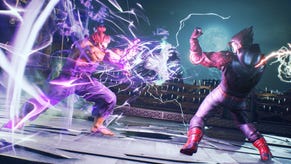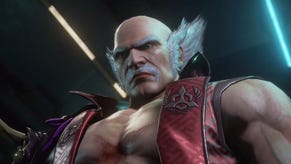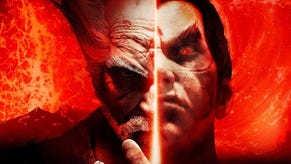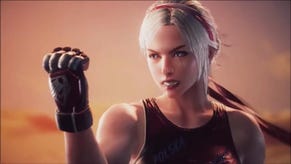Tekken 7's Katsuhiro Harada talks eSports ambitions, balance and fan feedback
Tekken's boss goes deep on balancing Akuma, becoming an eSport and dealing with fan feedback.
After a successful stint in Japanese arcades Tekken 7 is bulking up for its console outing. The big news out of E3 was the addition of a cinematic story mode in the game that seamlessly transitions from story sequence to gameplay and back again. It looked great, and my hands-on at the show was equally satisfying.
At Gamescom series boss Katsuhiro Harada and game designer Michael Murray detail a little more of this. They reveal the story mode will (of course) focus on the battle between Heihachi and Kazuya over control the Mishima Zaibatsu clan and happily show off a little of the story's scope. There's new stages, specific costumes for certain story events and even flashbacks to flesh out the backstory.
"There's been collaborations in the past between fighting franchises, but we never really saw a kind of cross over like this - one where you could take so much of your existing knowledge and have it still be effective in the other game."
New characters will be woven into the story and the idea, the pair explain, is to let players actually experience some of the kinds of moments that made Tekken's PS1 CG ending sequences famous while in control. With any luck this'll mean we'll get to play out a QTE of throwing somebody into a volcano.
After a presentation and hands-on time, I had a few minutes with Harada and Murray. We started with the Tekken 7 addition I'm still most excited about: the inclusion of Street Fighter mainstay Akuma, whose fireballs and spinning kicks have translated remarkably well into this 3D fighter.
"It's actually the opposite," Harada beams when I ask if he's concerned about the power of Akuma in the game. There's some crazy combo videos online and some Tekken players have struggled to counter his 2D-minded abilities, but this, he explains, is the desired result.
"That's what we were hoping would happen - that players like Poongko who know the character well in Street Fighter could just take their Street Fighter skills that they've honed and easily port it over to Tekken."
It seems to be working. Poongko is historically a Street Fighter player, but placed third in Tekken 7 at EVO 2016 using Akuma.
"There's been collaborations in the past between fighting franchises, but we never really saw a kind of cross over like this - one where you could take so much of your existing knowledge and have it still be effective in the other game. It is a dream collaboration. People weren't expecting it, and were so thrilled to see it happen. He really does fit well into the Tekken environment."
There's a catch, of course. There always is. "Ono-san, the Street Fighter producer," Harada adds after a thoughtful pause. "He was pretty happy each time Akuma would win a match, so... that was kind of irritating."
"It wasn't called eSports at the time, but fighting games have always had their own events and tournaments that they organise themselves. It's a natural progression for us."
Murray, who is kindly translating, laughs. "Is that why we made him weaker?!" Harada can only smirk and shrug.
One major thing that has changed for fighting games is the growth of eSports. After mentioning EVO, Harada went on to talk about ambitions in the eSports space and why he feels fighting games have a natural edge over the competition.
"Well, y'know, it wasn't called eSports at the time, but fighting games have always had their own events and tournaments that they organise themselves. It's a natural progression for us," he explains. "Although there's pro players and that sort of thing popping up, the way that people enjoy fighting games probably hasn't changed that much.
"Personally, I think that eSports and fighting games are a good match. If you look at other genres, for example shooters or MOBAs, they're largely team-based, right? A fighting game is one on one, and I think that really draws out the player's personality and because of that it's more fun to watch - it can end up being kind of like a boxing match or something, where you have these strong rivalries and a lot of salt when people win or lose. I think they lend themselves well to spectating and the world of eSports as a whole."
When asked if the explosion of popularity for eSports has been felt on the development side, Harada admits it has, but is also coy about what that'll mean.
"We do hope to do as much as we can with the game to make it more eSports friendly so that people who enjoy that scene can enjoy our game even more," he says. "So please look forward to more info on that."
From balance changes to issues around the representation of Tekken's female cast, the Tekken fanbase can be quite vocal. Harada is also one of the few Japanese developers who makes himself readily available to fans all over the world with a particularly active and responsive Twitter presence. The same is true for Murray. How, I ask, do they filter the genuine comments from the noise?
"In truth, things are decided more logically," Harada answers. "I mean that as in... we gather data from online polls, but we also look at the game data from the arcade. Also from the console versions, when they launch - we can glean data about which characters are used the most, win/loss, those sorts of things. So... we try to finally decide on such things by looking at the raw number data rather than subjective data from twitter or places like it.
"We have to think about what their underlying motives are, because if we just give fans what they ask for, they're still not going to be happy."
"What we do use Twitter for is... that data, it can sometimes be hard to see upcoming trends or something completely new. For example, what we already have and if people are using it or really like it is easy enough to see from the numbers. But in terms of what they'd like to see that hasn't been done before and any other new ideas, these things are more subjective - that's easier to find out from twitter.
"That said, we don't even take the comments at face value - most of the time somebody's saying something, but the truth is that what they're saying isn't exactly what they want. We have to look and say - what is the underlying cause that's led to them saying that particular thing?
"We have to think about what their underlying motives are, because if we just give fans what they ask for, they're still not going to be happy," he concludes with a laugh. "But what is the underlying reason for these people saying what they're saying? If we can get to that, we can properly solve their problems."
Tekken 7 is arriving for PS4, Xbox One and PC in Early 2017.
